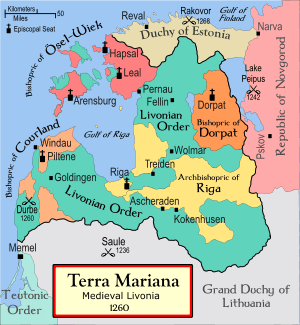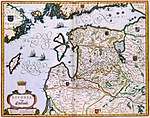Archbishopric of Riga
The Archbishopric of Riga (Latin: Archiepiscopatus Rigensis, Low German: Erzbisdom Riga) was an archbishopric in Medieval Livonia, a subject to the Holy See. It was established in 1186 as the bishopric of Livonia at Ikšķile, then after moving to Riga it became the bishopric of Riga in 1202 and was elevated to an archbishopric in 1255.
Archbishopric of Riga | |||||||||||||||
|---|---|---|---|---|---|---|---|---|---|---|---|---|---|---|---|
| 1186–1561 | |||||||||||||||
 Seal
| |||||||||||||||
 Archbishopric of Riga (in yellow), shown within Terra Mariana | |||||||||||||||
| Status | Prince-Bishopric of Terra Mariana | ||||||||||||||
| Capital | Riga | ||||||||||||||
| Common languages | Latin Low German Livonian Latvian | ||||||||||||||
| Government | Theocracy | ||||||||||||||
| Archbishop of Riga | |||||||||||||||
• 1245–73 | Albert Suerbeer (first) | ||||||||||||||
• 1539–63 | Wilhelm von Brandenburg (last) | ||||||||||||||
| Historical era | Middle Ages | ||||||||||||||
• Established | 1186 | ||||||||||||||
• Disestablished | 1561 | ||||||||||||||
| Currency | Livonian Penny Livonian Schilling | ||||||||||||||
| |||||||||||||||
Part of a series on the |
|---|
| History of Latvia |
 |
|
Ancient Latvia
|
|
Modern Latvia
|
| Chronology |
|
|

Archbishops of Riga
The archbishops of Riga were also the secular rulers of Riga until 1561 when during the reformation the territory converted from Catholicism to Lutheranism and all church territories were secularized. The see was restored as a diocese of the Catholic Church in 1918 and raised into an archdiocese in 1923.
Bishops and Archbishops of Riga
| Bishopric of Livonia (Bishopric of Üxküll) 1186–1255 | ||
|---|---|---|
| 1186–1196 | Saint Meinhard | |
| 1196–1198 | Berthold of Hanover | |
| 1199–1202 | Albert of Riga | |
| Bishopric of Riga 1202–1255 | ||
| 1202–1229 | Albert of Riga | |
| 1229–1253 | Nikolaus von Nauen | |
| 1245–1255 | Albert Suerbeer | |
| Archbishopric of Riga 1255–1561 | ||
| 1255–1273 | Albert Suerbeer | |
| 1273–1284 | Johannes I of Lune | |
| 1285–1294 | Johannes II of Vechten | |
| 1294–1300 | Johannes III of Schwerin | |
| 1300–1302 | Isarnus Tacconi of Fontiès-d'Aude | |
| 1303–1310 | Jens Grand titular, never came to Riga | |
| 1304–1341 | Friedrich von Pernstein | |
| 1341–1347 | Engelbert von Dolen | |
| 1348–1369 | Bromhold von Vyffhusen | |
| 1370–1374 | Siegfried Blomberg | |
| 1374–1393 | Johannes IV von Sinten | |
| 1393–1418 | Johannes V von Wallenrodt | |
| 1418–1424 | Johannes VI Ambundi[1] | |
| 1424–1448 | Henning Scharpenberg | |
| 1448–1479 | Silvester Stodewescher | |
| 1479–1484 | Sede vacante (empty seat) | |
| 1484–1509 | Michael Hildebrand | |
| 1509–1524 | Jasper Linde[2] | |
| 1524–1527 | Johannes VII Blankenfeld[3] | |
| 1528–1539 | Thomas Schöning | |
| 1539–1563 | Wilhelm von Brandenburg | |
A new Bishopric of Livonia was established in Latgalia in 1621 during the Inflanty Voivodeship of the Polish–Lithuanian Commonwealth.
Coinage
The Archbishops of Riga were innovators in the field of minting currency, reviving techniques abandoned since the collapse of Rome. The names of individual archbishops after 1418, as well as the years of their respective reigns, are stamped on Livonian pennies excavated at archaeological sites. In many cases, this is the only biographical data available. No Livonian pennies before 1418 have been found.
See also
- Bishopric of Courland
- Bishopric of Dorpat
- Bishopric of Ösel-Wiek
- Bishopric of Reval
- Livonian Crusade
- Livonian Brothers of the Sword
- Monastic state of the Teutonic Knights
External links
- More information about the role of the Archbishopric of Riga in the history of coinage is available at Medieval Livonian Numismatics by William Urban
- Archbishopric of Riga (Archived 2009-10-25)
- Rīgas arhibīskapija (1255-1562)
- Rīgas bīskapija un virsbīskapija
References
- Wendehors, Alfred (1989). Das Stift Neumünster in Würzburg (in German). Walter de Gruyter. p. 503. ISBN 3-11-012057-7. Retrieved 2009-07-22.
- due to deflation, no coins were minted during the reign of Jasper Linde; biographical data exists in alternate formats
- due to deflation, no coins were minted during the reign of Johannes VII Blankenfeld; biographical data exists in alternate formats